FORCLIME
Forests and Climate Change ProgrammeTechnical Cooperation (TC Module)

Select your language
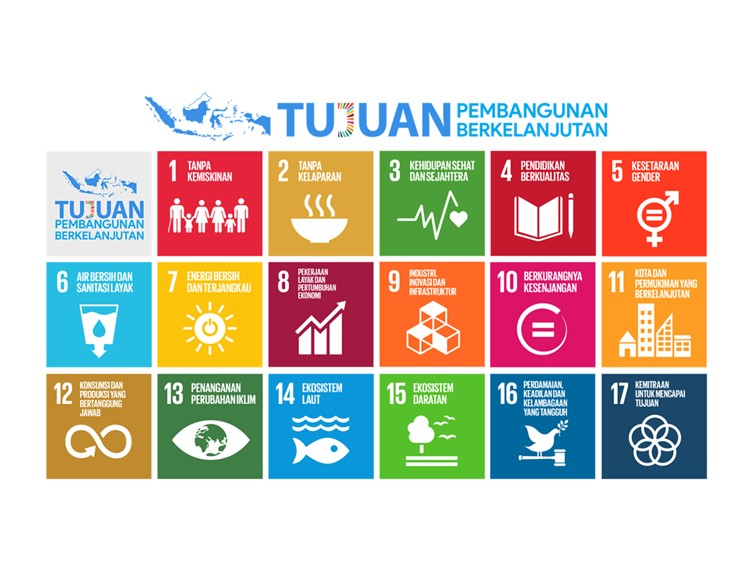
Sustainable Development Goals at the Ministry of Environment and Forestry
Indonesia's commitment to implement the Sustainable Development Goals is realized by the issuance of the Presidential Regulation on SDGs (Perpres) Number 59 of 2017, which specifies the Implementation of the Achievement of the Sustainable Development Goals. The regulation was created in a participatory manner, involving all parties.
As a follow-up to the Presidential Regulation, the Ministry of Environment and Forestry (MoEF) issued Decree Number: SK.346 / MENLHK / SETJEN / SET.1 / 8/2018 on 9 August 2018, which concerns the Establishment of a Working Group for Sustainable Development Goals at the Ministry of Environment and Forestry. The decree aims to streamline and optimize the achievement of integrated and coordinated Sustainable Development Goals within the Ministry of Environment and Forestry.
FORCLIME’s support
The Ministry of Environment and Forestry's Planning Bureau, supported by FORCLIME, is the driver of the SDG Working Group. The Working Group met every Thursday from June to September in 2018. At each meeting, the WG members discussed the SDG Achievement Target Matrix, which is delivered by two work units (Echelon 2 level). The meeting series produced the main input for MoEF’s input on SDGs which was later compiled and developed as the Roadmap of Sustainable Development Goals of the Ministry of Environment and Forestry.
FORCLIME Technical Cooperation (TC Module) had an active role in the process of drafting the Decree of the Minister of Environment and Forestry as mentioned above, from the preparation up to its provision.
Furthermore, FORCLIME will support the Implementation Team, Working Group and Expert Team for Sustainable Development Goals of 2017-2019 at the Ministry of Environment and Forestry to mainstream Sustainable Development Goals into environmental and forestry development plans.
The SDG Road Map of the Ministry of Environment and Forestry
The MoEF SDG Roadmap Draft refers to the 2015-2019 SDG National Action Plan document, attached to the BAPPENAS Regulation Number 7 in 2018. It is stated in the National Action Plan that MoEF activities match to 7 objectives, namely Goal 3 (Good Health and Well-being); Goal 6 (Clean Water and Sanitation); Goal 9 (Industry, Innovation and Infrastructure); Goal 11 (Sustainable Cities and Communities); Goal 12 (Responsible Consumption and Production); Goal 13 (Climate Action); and Goal 15 (Life on Land). In the National Action Plan of SDGs, the MoEF is the main driver in achieving Goals 12, 13, and 14 as well as co-supervisor for objectives 6 and 11. These objectives are included in the pillars of environmental development.
Way Forward
The draft of the MoEF SDG Road Map has been completed and is ready to be signed by the Minister. The next step will be the dissemination and socialization to various related parties which will involve FORCLIME-TC in its implementation.
For further information please contact:
Wandojo Siswanto, Manager of Strategic Area Forestry Policy
Mohamad Rayan, Adviser for Crosscutting Issues and Conflict Management
Indonesia ratified the Paris Agreement through Law 16 of 2017 and submitted the Indonesian NDC (Nationally Determined Contribution) to the UNFCCC on 24 September 2017. As outlined in the NDC, Indonesia has targeted to reduce GHG emissions up to 29% by 2030 in a business as usual (BAU) scenario and up to 41%, with international support. The focus sectors are Forestry, Energy, Agriculture, Industry and Waste Management. The NDC is mainstreamed through development plans at all levels (national, province, district, and village level). Funding sources for these development plans are budgeted at all respective levels and further sources, such as private sector and international funds are being tapped into.
The NDC funding is project based and sectoral based, the funds can be sourced from national and subnational sources, grants (multilateral and bilateral funding) and from other sources, including the private sector. Bilateral mechanisms are derived from Norway for REDD+, Germany for energy efficiency and Japan for energy efficiency and technology transfer through a Joint Crediting Mechanism (JCM). Multilateral funding is granted by the Adaptation Fund under the Kyoto Protocol; special climate change funds and the Least Developed Countries Fund managed by the Global Environmental Fund (GEF) and the Green Climate Fund (GCF) under UNFCCC for adaptation and mitigation. The access to the GCF is managed by the GCF Board and the Designated National Authority (DNA) in the Ministry of Finance. Furthermore, non-UNFCCC multilateral funding from multilateral development banks is available, such as from World Bank (BioCarbon Fund) and ADB (Climate Change Mitigation, Clean Energy Program, Funds and Partnerships).
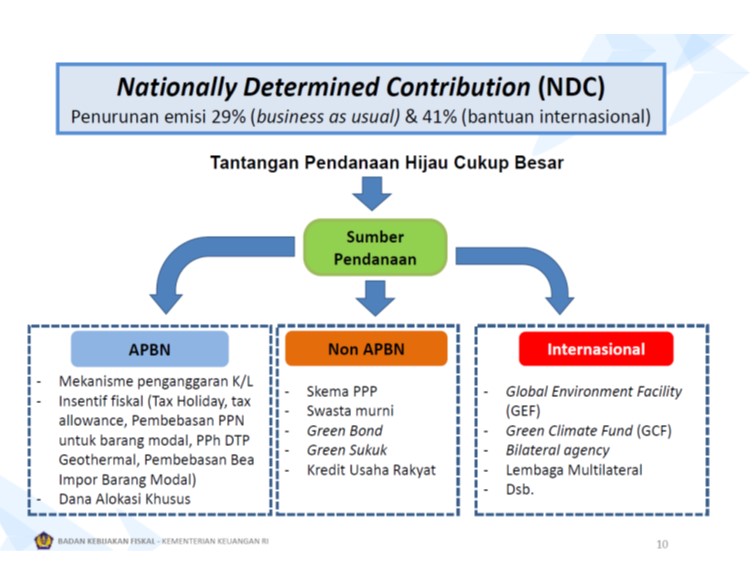
The most recent development regarding climate change financing is the establishment of the Public Service Agency (Badan Layanan Umum - BLU). The BLU is a Guiding Committee, which is composed of the Ministry of Environment and Forestry (KLHK), the National Planning Body (Bappenas) and the Ministry of Finance (Kementerian Keuangan). The BLU monitoring is organized by a team, which represents national governments (ministries and agencies) and non-government institutions. The beneficiaries could be government institutions, academics, researchers, CSOs and smallholders (Source: Ir. Achmad Gunawan Widjaksono, MAS, 5 September 2017).
What is FORCLIME’s contribution?
Prior to the merging of the State Ministry of Environment and the Ministry of Forestry, FORCLIME has supported Indonesian policy development processes regarding climate change via the Ministry of Forestry. The objective was to improve at least two elements of the REDD+ architecture (e.g. MRV, safeguards, and benefit sharing mechanisms) at national and sub-national level in coordination with relevant institutions.
During the period of 2009 to 2013, FORCLIME supported the development of the Ministry of Forestry decree on carbon licenses and its incentive mechanisms. However, the regulation is revoked, as it is lacking synchronization with the development of financing mechanisms in the Ministry of Finance.
FORCLIME, in cooperation with other German support programme, PAKLIM, supported the development of the Trust Fund Mechanism called Indonesia Climate Change Trust Fund (ICCTF) in 2009. GIZ contributed technical assistance on its development. The ICCTF is a nationally-managed trust fund that aims to contribute effectively and efficiently to mainstreaming climate change adaptation and mitigation funded activities in government planning and implementation across Indonesia (source: ICCTF website). Additionally, the task of ICCTF is to distribute the received funds to appropriate climate change activities. In 2015, ICCTF funded six programs in locations across Indonesia in line with its thematic focus in: Land-based mitigation, energy, resilience and adaptation.
Furthermore, FORCLIME contributed to the development of a policy brief about “Instruments and Mechanisms for Financing the Greenhouse Gas Emission Reduction Programmes”. The policy brief was developed by the Ministry of Finance, involving the Ministry of Forestry and supported by GIZ projects. The mechanism for financing the greenhouse gas emission reduction programmes is using the trust fund mechanism as seen below in the graphic.
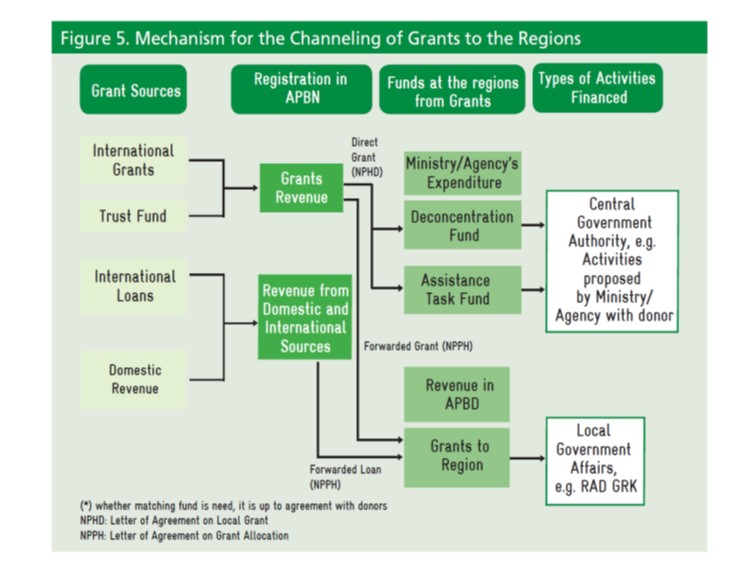
Since December 2015, FORCLIME supported the Ministry of Environment and Forestry in various activities on REDD+ architectures such as the Safeguards Information System (SIS), the National Registry, the Forest Reference Emission Level (FREL) development and incentive mechanism. A study in Malinau district about a district financial mechanism at village level, called Gederma, was undertaken in collaboration with the University of Indonesia and the RCCC-UI (Research Center for Climate Change - Universitas Indonesia). The study concluded the possibility of fiscal transfer from the national government to village level.
On 4 to 8 September 2017, FORCLIME in cooperation with the University of Indonesia facilitated an exchange on green finance mechanisms between senior members of the Indonesian parliament, the Ministry of Finance, the Ministry of Environment and Forestry, BAPPENAS and the district governments of Berau (East Kalimantan), Kapuas Hulu (West Kalimantan) and Sigi (Central Sulawesi) with Indian senior experts in Dehradhun and New Delhi. The 17-person delegation spoke to the stakeholders involved in the 14th Financial Commission on the Indian landmark decision to include forest cover in the devolution formula, which specifies the amount of domestic funds transferred from central government to state level. Due to this decision, forest conservation has gained value within the financial transfer mechanism. As a result, an estimated six billion US dollars are being transferred yearly to local level as unconditional funds based on the performance of states in forest conservation. Due to the study tour to India, delegates gained a new perspective and understanding on how to justify transfer mechanisms for forest conservation. The delegates also gained an overview of fiscal policy formulation and governance.
Way Forward
FORCLIME will focus on further developments of fiscal mechanisms for green funding. Additionally, FORCLIME will convene a forum to discuss the possibilities for an enhanced fiscal mechanism and policies that will benefit districts and provinces.
This focus will be coordinated with the Ministry of Environment and Forestry via the Directorate General of Climate Change Control and relevant stakeholders for the activity implementation, such as the RCCUI, will be engaged.
For more information, please contact:
Wandojo Siswanto, Strategic Area Manager for Forest Policy
Mohammad Rayan, Advisor Crosscutting Issues and Conflict Resolution
Background and objectives
In the framework of forest governance and the preparation for Forest Management Unit (FMU) management plans, data and information on the potential of forest resources, characteristics of the area and other information is required. To obtain these data and information it is necessary to conduct forest inventory activities in the respective area.
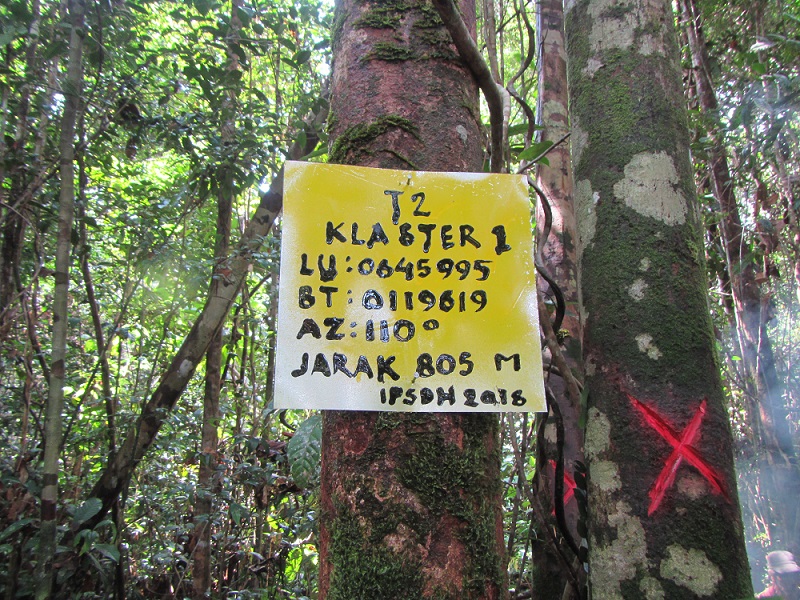
The application of sound and efficient forest inventory methods at FMU- level is a precondition for the formulation of 10-year and annual management plans. Specific inventories need to be conducted on a regular basis at FMU, resort and compartment level to provide a foundation for forest management by determining timber and non-timber forest products.
During a two-year process from March 2015 until January 2017 the former technical guideline on forest inventories for FMUs was revised within a participatory process including national and international experts, different stakeholders on national (Indonesian Ministry of Environment and Forestry KLHK, universities) and subnational (technical implementation units of DG Planology - BPKH, FMU) level supported by FORCLIME.
The main approach of the Ministry regarding the revision of the forest inventory guideline was to implement an inventory guideline which applies the following requirements:
A milestone input for the development of a new forest inventory guideline was the development of a publication ’’Definition of a minimum standard for forest management inventories on FMU level’’ by the Forest Eye consultant team of University of Göttingen. This minimum standard served as advisory input for the revision of the technical guideline by the Ministry-Directorate for Forest Resources Inventory and Monitoring (IPSDH). The publication provides key stakeholders of forest inventories and FMU management staff with comprehensive multifaceted aspects of forest management inventories and gives recommendations on methodology, design and implementation. The new technical guideline for forest inventory in production and protection FMUs was enacted in January 2017 (P.1/PKTL/IPSDH/PLA.1/1/2017: Petunjuk Teknis Inventarisasi Hutan dan Sosial Budaya pada Kesatuan Pengelolaan Hutan Lindung dan Kesatuan Pengelolaan Hutan Produksi).
1) Field test
In February 2018, IPSDH conducted an organisational and methodological study in order to test the practicability of the guideline under field conditions. The test was done in order to identify problems being faced in the implementation of forest inventory in production FMU (KPHP) and protection FMU (KPHL), both regarding technical and administrative aspects, as well as obtaining certainty on the resources needed with respect to the amount of time, budget, equipment, and personnel.
The respective study took place in the area of FMU Kapuas Hulu Utara, West Kalimantan.
For the field test, 4 teams inventoried following different forest types inside 3 village forests:
Each team consisted of seven team members: one forest inventory expert from KLHK (IPSDH) as team leader, 2 staff from FMU Kapuas Hulu Utara and 4 supporting workers from local communities.
During the field test, detailed records were produced which allowed to analyze the result in terms of identification of measurement constraints while implementing cluster and plots establishment, measurement of stands forest, shift of cluster, measurement of non-timber forest products, biodiversity and environmental services, based on technical aspects like time, equipment and personnel with respect to the forest inventory guideline.
FORCLIME supported the preparation, implementation and follow-up of the field test.
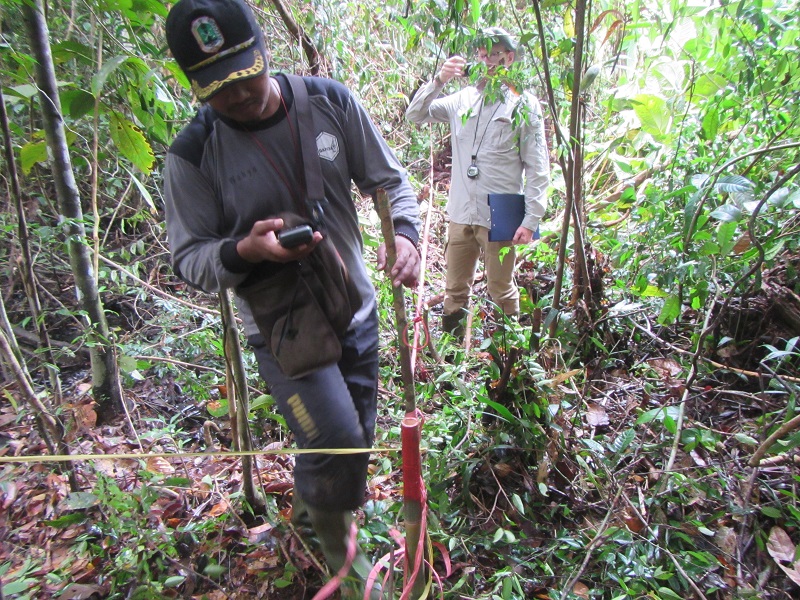
2) Evaluation of the field test
A Focus Group Discussion (FGD) on all experiences gathered with the revised guidelines was conducted on April 12-13, 2018, in Bogor. This FGD aimed on evaluating the technical aspects and efficiency of the technical concept as well as involvement of BPKH and related directorates in order to improve the forest and socio-cultural inventory guidelines in a future revision.
During the FGD, needs for amendment of the technical inventory guideline as well as for the socio-cultural inventory guideline have been discussed. During the event representatives of most of the technical implementation units (BPKH) from all over Indonesia, the Directorate for Forest Resources Inventory and Monitoring (IPSDH), the Training Centre for Environment and Forestry (BD LHK) Bogor, Bogor Agricultural University and FORCLIME discussed the findings of the field test as well as first experiences from implementing the guideline in FMUs in Sulawesi and Maluku. A long list of more than 20 inputs for the amendment of the guideline was collected for further improvement of the guidelines.
3) Lessons learned and way forward
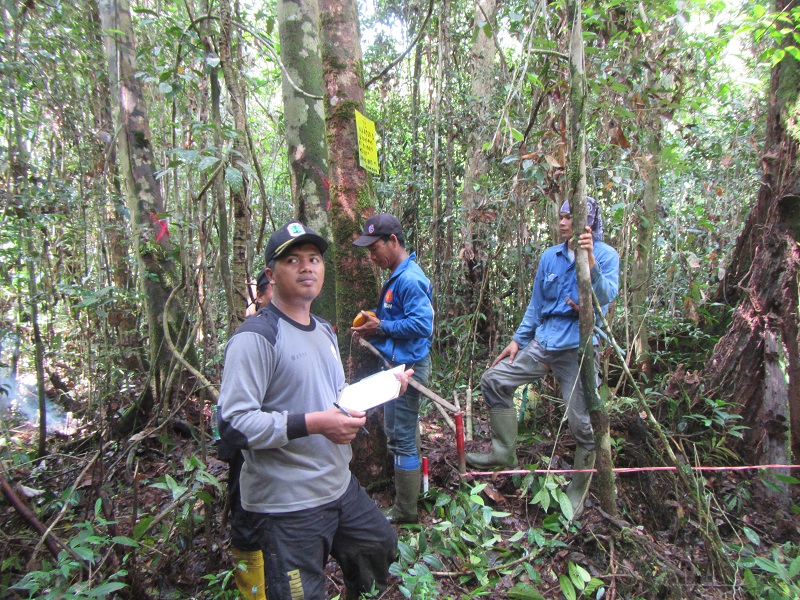
The focus group discussion for evaluation of the technical forest inventory guideline, socio-cultural inventory guideline and the standard of activity and cost brought many valuable inputs to be considered for a future revision of the guidelines. At the same time, an intense knowledge exchange between the different BPKHs with different work (i.e. forest) conditions took place.
The field test of inventory procedures provided valuable information with respect to implementing a realistic planning of inventory activities in the field.
The inputs for revision of the guidelines have been compiled and will eventually be used as basis for a future amendment of the guidelines by DG Planogy’s Directorate of Forest Resources Inventory and Monitoring (IPSDH). After final works on the regulation a new guideline will be available for FMUs ensuring proper planning processes and reliable planning results as a basis for sustainable forest management in Indonesia.
For more information, please contact:
Moritz Zetzmann, Development Adviser for forest management unit, Putussibau, West Kalimantan
Stephanie Wegscheider, Development Adviser for GIS
East Kalimantan has been among the early province to start the development of Forest Management Unit (Kesatuan Pengelolaan Hutan-KPH). It has been started back to 2007 when the first development of KPH model started. With Berau Barat, Tarakan and Bulungan the first KPH as a model were established in the region until the establishment of the new province of North Kalimantan, which separated KPH Tarakan and KPH Bulungan from East Kalimantan. Currently, East Kalimantan province is responsible to develop 21 KPHs consist of 18 KPHP, 2 KPHL and 1 KPHK (Taman Hutan Raya).
The Ministry of Environment and Forestry had established 529 FMU (KPH) to better manage state forests. The establishment is based on its forest function domination, i.e. in the form of KPHP (production forest) and KPHL (protection forest) and KPHK (for mainly conservation forest). It has been targeted that by 2020, 600 of KPHP and KPHL and, at least, 100 of KPHK will be established and operational. FORCLIME provides continuous support on the KPH development in Indonesia, particularly in its pilot districts: Berau Barat, Malinau and Kapuas Hulu. After UU 23/2014 on Regional Government (Pemerintahan Daerah), where the forest management authority integrated to provincial level, FORCLIME support is extended in strengthening FMU development at provincial level.
FORCLIME’s support on FMU-development at provincial level includes enhancement of human resources and institutional capacities, organizational development and institutional strengthening, support on facilitating planning processes and capacities, establishment of “KPH center” as a communication platform, etc. The effort to support province in FMU Development has been synergized with different partners such as GGGI (Global Green Growth Institute), The Nature Conservancy (TNC), Worldwide Fund for Conservation of Nature (WWF Indonesia), local partners as well as the Regional Council on Climate Change (Dewan Daerah Perubahan Iklim - DDPI).
Why KPH Development Roadmap?
The urgency of the establishment of KPH became more obvious since the shift of the forest authority from district to province and national level, which left no forestry institution at the field level besides KPH. This fact brings as a consequences to operate all KPHs as soon as possible. At the same time East Kalimantan has put a bigger commitment to sustainable development and climate change mitigation action, which requires the establishment of KPH as a pre-condition.
In order to have a clear way forward, set-up SMART targets and consolidate potential resources towards full operation of FMU, East Kalimantan developed a road map called “accelerated road map of FMU development in East Kalimantan (road map percepatan pembangunan KPH di Kalimantan Timur). This road map starts from the identification of requirement for independent KPH and the plan to achieve it. This roadmap shall also function as a coordinated reference for relevant stakeholders to support the KPH development in East Kalimantan.
What is KPH Development Roadmap?
Road map “Percepatan KPH” is based on 5 pillars for “KPH mandiri” (well running FMU) as the “end in mind”. This 5 pillars represent 5 conditions in which KPH could be considered well-operational. They are:
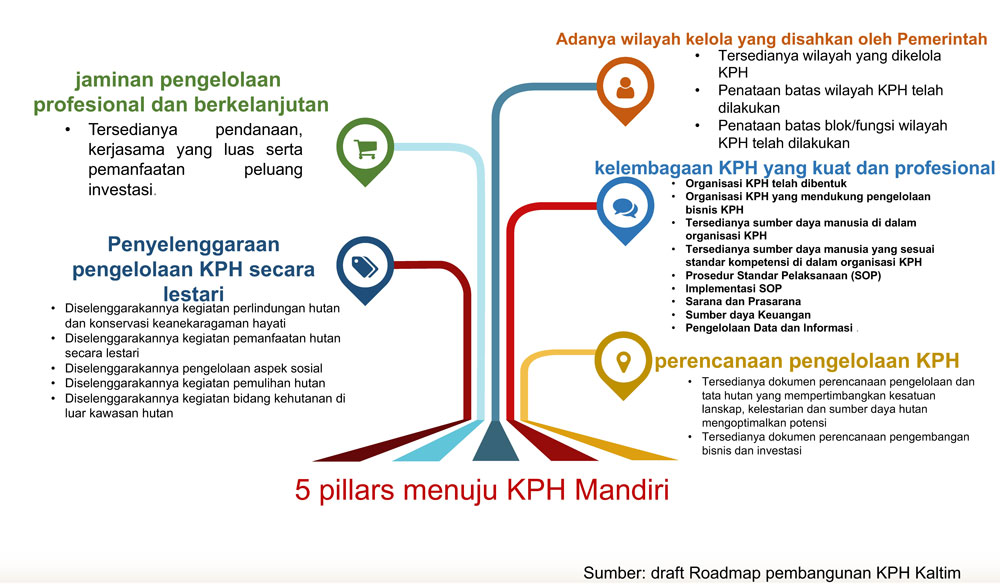
Those five pillars were elaborated to a series of criteria and indicators which levels of achievement will be measured, followed by action plans and milestones for different time frames (short, middle and long term). The road map is aimed to be a single map to be used by all stakeholders in East Kalimantan to support the development of present KPH toward KPH mandiri.
Lesson learned and the way forward
KPH development is a big challenge for the province due to limited resources, experience and human resource capacity. In this sense, KPH development needs to be a step-wise approach to achieve the ultimate goal. The step-wise approach needs a clear action plan and milestones to track the progress development. This road map should also serve as a basic document for different partners aimed on support of KPH development in the provinces including for the government. KPH road map describes targets and action for development needed accordingly to which different stakeholder can adjust their action plan and support.
The road map however need to be monitored. As part of the road map, partners in East Kalimantan through “KPH Center” as a kind of working group will develop a computer/web based monitoring system, through which the roadmap progress could be quantitatively measured.
In addition to monitoring process, legal or official status of the road map is also needed. Hence East Kalimantan government plans to issue this road map as a “Peraturan Gubernur” or Governor Regulation.
Contact for further information:
Duratmo Momo, Provincial Forestry Service of East Kalimantan
Tunggul Butarbutar, Technical Adviser for sustainable forest management, East Kalimantan Coordinator
The global GIZ Forest Governance Programme (FGP) and the bilateral German-Indonesian Forests and Climate Change Programme (FORCLIME) have been working together since 2013 in Indonesia, to improve forest governance and to strengthen access of local or customary communities to forest resources.
How does FORCLIME support the Resolution of Forest Conflicts?
The two GIZ programmes cooperate with the Indonesian multi-stakeholder platform Working Group on Forest Land Tenure (WGT) and the Ministry of Environment and Forestry on the mapping of customary forest, land use rights and related conflicts, as well as the development of innovative mechanisms for conflict resolution at local level in FORCLIME pilot districts Berau and Kapuas Hulu in Kalimantan.

What has been achieved so far?
In support of the resolution of land and forest related conflicts the following results have been achieved so far:

Way forward
The DRKL opens up significant opportunities for building staff capacity, and for developing connections and more effective coordination among the agencies and organizations responsible for natural resources management. DRKL must underscore a core commitment to neutrality, develop a clear mandate and designated responsibilities, promotes integration with other agencies and initiatives, including an expanded role and dedicated funding for conflict coordination and mediation.
FORCLIME will support the DRKL during a 3 years pilot phase up to the End of 2019. The focus in the early stages will be on piloting mediations and documentation of the processes and outcomes. Ways will have to be identified to share emerging lessons with a wider audience. The Komunitas Penyelesaian Konflik Sumber Daya Alam (KPKSDA) and the CRU-Technical Advisory Team meetings provide immediate opportunities for this purpose.
Furthermore, the DSKL will need assistance to develop an online system and data base for receiving reports about conflicts and referring them to the authorities in charge.
The District government of Kapuas Hulu will need to explore options for sustainable funding of conflict coordination and mediation. WGT-FORCLIME will ensure that activities, developments and lessons learned are communicated with the relevant authorities on national level and inputs are provided for future national legal and policy decisions in conflict resolution
Ultimately, experiences and lessons learned during the pilot phase may be replicated to other FORCLIME pilot districts.


